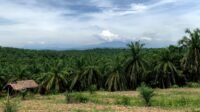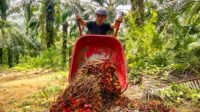PALMOILMAGAZINE, NEW YORK — The palm oil industry is emerging as a key driver in achieving Sustainable Development Goal 8 (SDG8), particularly in creating decent work and fostering economic growth in rural areas of developing countries like Indonesia and Malaysia. This was emphasized by Izzana Salleh, Secretary General of the Council of Palm Oil Producing Countries (CPOPC), during her address at the United Nations Headquarters in New York on July 16, 2025.
According to Izzana, palm oil has been a powerful economic engine that not only raises rural incomes but also supports the creation of formal jobs and stronger labor protections. These improvements are the result of planned reforms aligned with national rural development strategies and efforts to empower smallholder farmers.
“The palm oil industry significantly contributes to rural inclusion and economic growth. In Indonesia and Malaysia, it accounts for 3 to 5 percent of national GDP,” Izzana stated, as quoted by Palmoilmagazine.com from CPOPC, Monday (21/7/2025).
Also Read: Papua New Guinea Officially Joins CPOPC for Sustainable Palm Oil
She noted the sector supports approximately 24 million jobs worldwide. In Malaysia, full employment has been achieved since 2000, with palm oil being a major contributor — particularly in the state of Pahang, where 57 percent of smallholders were previously unemployed.
Izzana also highlighted advancements in labor standards. Large companies now comply with minimum wage laws, health protections, maternity leave, and have cut workplace accidents by up to 50 percent through safety protocols like the use of PPE, mobile clinics, and complaint systems.
Labor rights and inclusion have also progressed, with certification schemes such as the Malaysian Sustainable Palm Oil (MSPO), Indonesian Sustainable Palm Oil (ISPO), and Roundtable on Sustainable Palm Oil (RSPO) incorporating international labor norms. These include child labor prohibition, fair wages, gender equality, the right to organize, and accessible grievance mechanisms.
Women are increasingly taking on leadership roles, particularly in processing facilities. Social protections — including insurance, housing, and childcare services — are also expanding to cover both migrant and domestic workers.
“Heading toward 2030, we are witnessing major reforms in the palm oil sector — from job formalization and mechanization to workforce upskilling. This proves the industry can pave the way toward a more inclusive and sustainable future,” Izzana concluded. (P2)





































